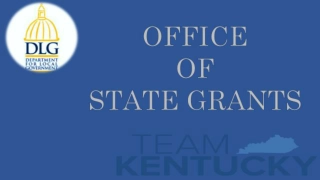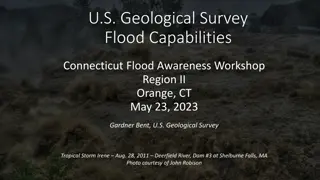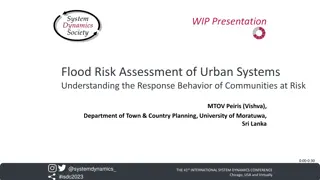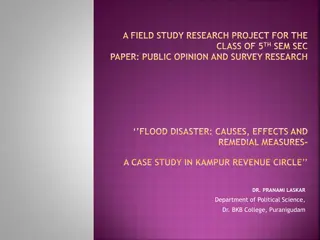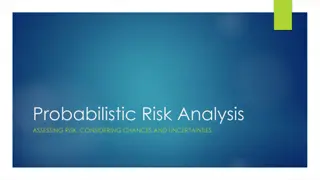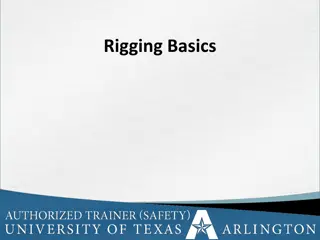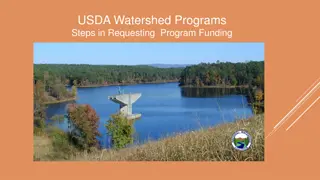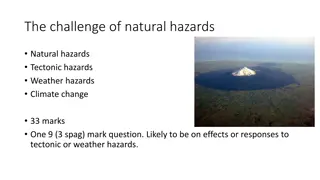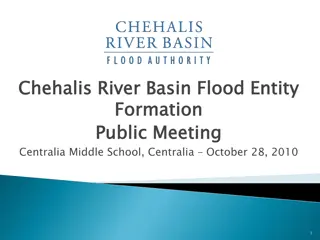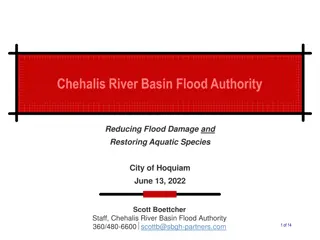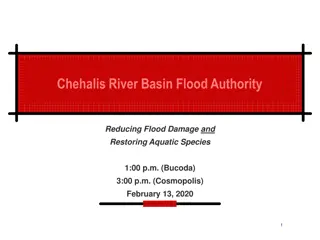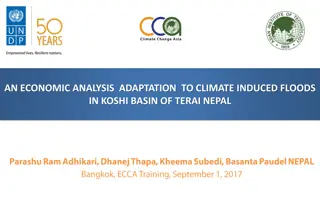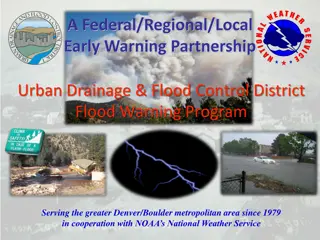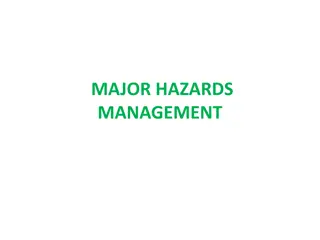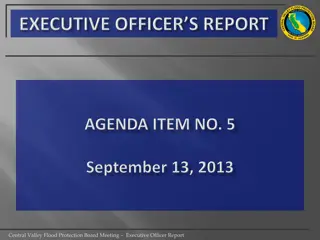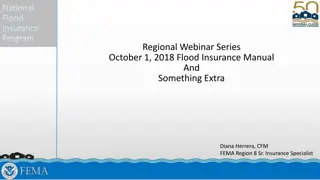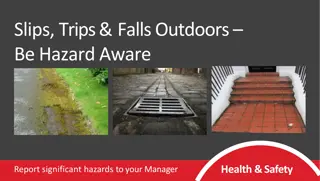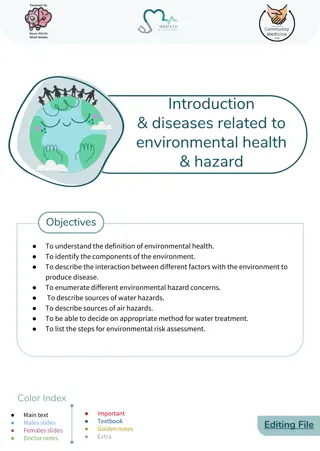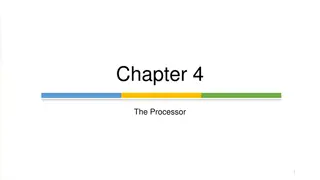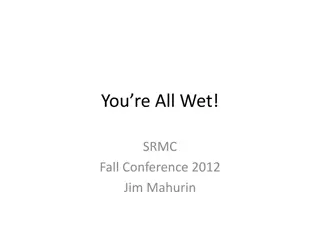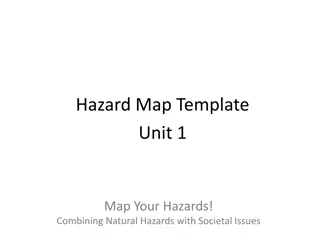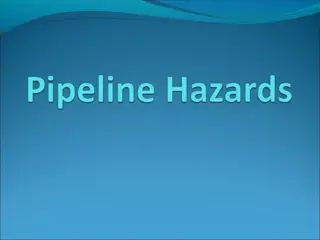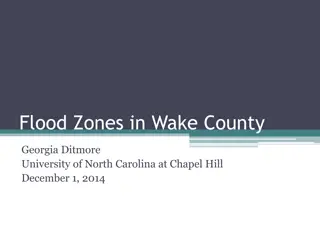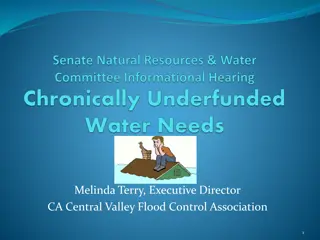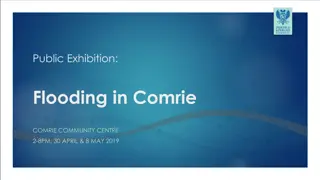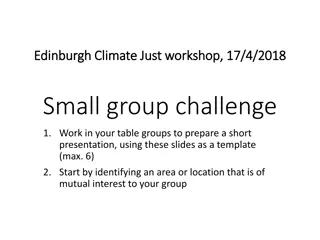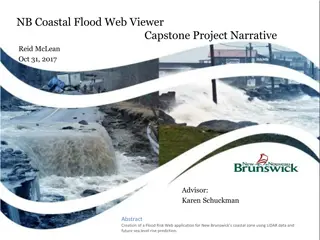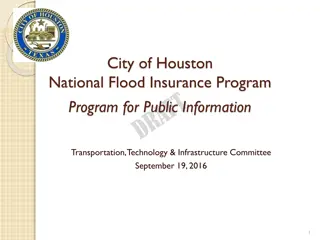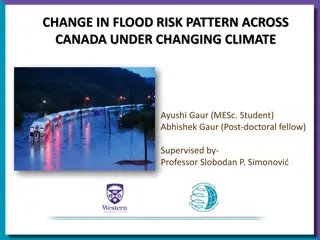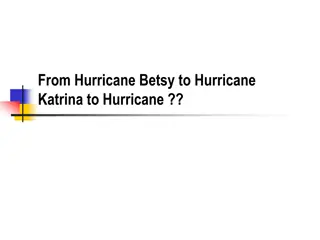Office Of State Grants
The Flood Control Local Match Participation Program (LMPP) provides grants to help local governments meet non-Federal cost-share requirements for flood-related projects, flood control planning, and mitigation activities. Funding can be used as matching funds with various federal agencies and program
2 views • 9 slides
Understanding the National Flood Insurance Program (NFIP) and Floodplain Management
Explore the National Flood Insurance Program (NFIP) and its workshops across Connecticut, covering topics such as flood awareness, certified floodplain management, flood maps, roles and responsibilities, and the significance of the 100-year floodplain. Learn how FEMA, the State NFIP Coordinator, and
0 views • 37 slides
Introduction to Flood Risk Assessment with HEC-FDA Overview
This presentation delves into flood risk assessment using HEC-FDA software, covering topics such as defining flood risk, components of uncertainty, consequences of flood risk, and methods to assess flood risk including hydrology, hydraulics, geotechnical, and economics. It explores the intersection
6 views • 39 slides
U.S. Geological Survey Flood Capabilities.
Explore the U.S. Geological Survey's flood capabilities in Connecticut, including real-time streamflow data, precipitation monitoring, groundwater levels, and more. Access tools for flood documentation, peakflow analysis, and national water monitoring through interactive dashboards. Stay informed an
3 views • 19 slides
Understanding Urban Flood Risk and Community Response Behavior
Flood risk assessment in urban systems involves complex interactions among natural, physical, and social elements. Factors such as population vulnerabilities, disparities in socioeconomic status, and post-disaster recovery challenges impact how communities respond to flood events. This research expl
3 views • 4 slides
Ensuring Mine Road Safety: Key Controls and Hazards
National Mine Safety Week 2023 focuses on safe road conditions in mining areas. The environment poses risks like overhanging trees and weather conditions, while road-related hazards include heavy loads and road design issues. This article highlights driving hazards, road design and maintenance hazar
0 views • 9 slides
Workplace Hazards and Safety Measures Awareness
Learn about common workplace hazards such as falls, chemical exposure, fire, electrical hazards, and repetitive motion injuries. Understand the risks associated with these hazards and the importance of prioritizing safety in the workplace to prevent accidents and injuries. Stay informed and take pro
1 views • 33 slides
Study on Flood Disaster in Kampur Revenue Circle: Causes, Effects, and Remedial Measures
This field study research project focuses on exploring the causes, effects, and remedial measures of flood disasters in the Kampur Revenue Circle of Assam. The study aims to understand the impacts of floods on the environment, agriculture, and human society, providing insights for effective preventi
0 views • 15 slides
Understanding Probabilistic Risk Analysis: Assessing Risk and Uncertainties
Probabilistic Risk Analysis (PRA) involves evaluating risk by considering probabilities and uncertainties. It assesses the likelihood of hazards occurring using reliable data sources. Risk is the probability of a hazard happening, which cannot be precisely determined due to uncertainties. PRA incorp
1 views • 12 slides
Rigging Safety and Hazards Awareness
Learn about common rigging hazards, including fall hazards, struck-by and crushing hazards, electrical hazards, and rigging failure examples. Understand the importance of proper training, equipment inspection, and safety protocols to prevent accidents and injuries in rigging operations.
0 views • 34 slides
Understanding USDA Watershed Programs for Local Communities
USDA Watershed Programs offer assistance in addressing natural resource issues such as flood control, repairing flood damages, and rehabilitating flood control dams. The three major components - Emergency Watershed Program (EWP), Watershed Protection and Flood Control Program (WPFO), and Watershed R
0 views • 15 slides
Understanding Natural Hazards and Their Impacts
Natural hazards, including tectonic and weather-related events, pose significant risks to humans and property. The effects and responses to tectonic hazards vary based on wealth levels in different regions. Earthquakes and volcanic eruptions result from physical processes, with patterns observed alo
1 views • 15 slides
Addressing Flooding Issues in Chehalis River Basin: Formation of Flood District
Formation of a multi-county flood district in the Chehalis River Basin to combat repeated major flooding events, which have caused significant damages and disruptions over the years. The establishment of the Flood Authority as a temporary entity to address flood issues and the steps taken to mitigat
0 views • 24 slides
Chehalis River Basin Flood Authority's Local Projects and Achievements
The Chehalis River Basin Flood Authority, established in 2008, focuses on flood mitigation strategies informed by science to protect residents and communities. Through various projects like the Raymer Street Pump Station in Hoquiam, the authority has significantly reduced flood damage, enhanced comm
0 views • 17 slides
Chehalis River Basin Flood Authority Update and Collaboration Highlights
The Chehalis River Basin Flood Authority is making significant progress in reducing flood damage and restoring aquatic species through a Basin-wide strategy. The key messages focus on collaboration among various entities and the importance of a multi-phased approach to protect communities. The backg
0 views • 48 slides
Economic Analysis of Climate-Induced Flood Adaptation in Koshi Basin, Nepal
This project aims to assess the impact of climate-induced floods on agriculture in the Koshi basin of Terai, Nepal. By evaluating flood risk, economic costs, and different adaptation options, the study seeks to enhance resilience in the face of increasing flood occurrences catalyzed by climate chang
0 views • 9 slides
Ancient Flood Narratives: Sumerian, Babylonian, and Hebrew Accounts
Ancient flood narratives from Sumerian, Babylonian, and Hebrew sources depict stories of divine displeasure, flood planning, and survival through boat-building. Enlil, Enki, and Yahweh play key roles in warning individuals like Uta-napishtim, Atrahasis, and Noah to build boats and save life forms du
0 views • 8 slides
Flood Warning Program of Urban Drainage & Flood Control District
Since 1979, the Federal/Regional/Local Early Warning Partnership of the Urban Drainage & Flood Control District has been providing the greater Denver/Boulder metropolitan area with early flood threat notifications, primarily for flash floods. Working in collaboration with NOAA's National Weather Ser
2 views • 23 slides
Understanding Environmental Hazards and Management
Exploring major hazards management, geology perspectives, ecological concepts, natural environmental hazards, classes of natural hazards, and introduction to environmental hazards management. The content covers ecological levels, abiotic factors, biomes, environmental degradation, and more.
0 views • 10 slides
Central Valley Flood Protection Board Meeting Executive Officer Report
The Central Valley Flood Protection Board Meeting Executive Officer Report discusses various key topics including personnel, urban and rural levee protection criteria, flood system improvement projects, major proposals, and future projects like the Sutter Bypass 2D Hydraulic Model. The report covers
0 views • 4 slides
Flood Definitions and Impacts on Insurance Claims
Understanding various aspects of riverine and coastal flooding, along with related politics, can shed light on the importance of FEMA flood definitions in determining insurance claim payouts. Topics include floodplain areas like floodway and flood fringe, types of buildings with insurance rates, and
0 views • 27 slides
National Flood Insurance Program Overview
Explore the details of the National Flood Insurance Program (NFIP) from a regional webinar series, covering policy refresher, rating factors, definitions of flood and building, and more. Gain insights into coverage limits, waiting periods, eligibility criteria, and factors affecting policy qualifica
0 views • 25 slides
Preventing Slips, Trips, and Falls: Hazard Awareness and Safety Guidelines
Be aware of hazards both indoors and outdoors to prevent slips, trips, and falls. Keep work areas clear, return equipment to designated places, and report hazards to managers promptly. Look ahead for hazards, avoid distractions while walking, and conduct dynamic risk assessments to ensure safety. Re
0 views • 4 slides
Understanding Environmental Health and Hazards
The field of environmental health focuses on preventing human injury and illness by evaluating and limiting exposure to hazardous agents in the air, water, and soil. Various environmental hazards such as water and air pollution, climate change, and occupational hazards pose significant risks to huma
0 views • 10 slides
Understanding Processor Hazards and Pipeline Stalls
Explore processor hazards like load-use and data hazards, along with strategies to avoid stalls in the pipeline. Discover how to detect and handle hazards efficiently for optimal performance in computer architecture. Learn about forwarding conditions, datapath design, and the impact of hazards on in
0 views • 30 slides
Understanding Flood Insurance Coverage in Detail
This comprehensive presentation delves into the intricacies of flood insurance coverage, from primary sources to specific rules and regulations. Key topics include federal flood coverage, property eligibility criteria, private flood insurance limitations, important flood zone measurements, average f
0 views • 22 slides
Combining Natural Hazards with Societal Issues: Unit 1 Hazard Map Template
Delve into Unit 1 of the Hazard Map Template, identifying and locating regions susceptible to hazards by choosing top hazards in the mapping area. Create hazard maps, combine shapes, and include a key and sources for a comprehensive view of potential hazards and vulnerabilities.
0 views • 13 slides
Understanding Pipeline Hazards in Computer Architecture
Pipeline hazards in computer architecture are classified into three categories: structural, data, and control hazards. Structural hazards occur due to conflicts in hardware resources, data hazards stem from dependencies between instructions, and control hazards arise from branching instructions. The
0 views • 42 slides
Understanding the Hydrological Cycle and Flood Hazards
This session with Dr. Patrick Asamoah Sakyi delves into the hydrologic cycle, causes of flooding, and ways to mitigate flood hazards. Topics covered include the hydrologic cycle, stream systems, flood consequences, factors affecting flood severity, and strategies for reducing flood risks. Recommende
0 views • 37 slides
Factors Affecting Flood Zones in Wake County, North Carolina
Analyze the factors influencing flood impacts in Wake County, North Carolina with a focus on proximity to water bodies, land cover, and impervious surfaces. Explore how county growth affects these factors, potential changes in flood zone areas, and implications for property risks. Consider using hyd
0 views • 15 slides
Workshop on Artificial Intelligence in Natural Hazards Engineering
This workshop focuses on exploring the integration of artificial intelligence and machine learning with natural hazards engineering, discussing data representations, classification models, combining ML with hazards simulations, and addressing classification problems in the field. Participants engage
0 views • 5 slides
Enhancing Flood Disaster Management through Integrated River Basin Approach
Explore the framework for effective Flood Disaster Management through a holistic approach, focusing on river basins' characteristics, environmental impacts, flood triggers, and sustainable solutions. Emphasizing the importance of urbanization management and governance for Disaster Risk Reduction to
3 views • 24 slides
Central Valley Flood Control Association - Addressing Flood Challenges in California
The Central Valley Flood Control Association (CCVFCA) works to mitigate the impact of regular floods that occur in California, causing significant damages and evacuations. With a history dating back to 1926, the CCVFCA addresses funding needs, state responsibilities, and challenges in ensuring publi
2 views • 12 slides
Public Exhibition on Flooding in Comrie at Community Centre
A public exhibition is being held at Comrie Community Centre to address flooding issues in the area. The presentation will cover topics such as the Tay Local Flood Risk Management Plan, actions on flooding, and next steps. The Tay FRM Strategy and Local FRM Plan outline measures to manage flood risk
0 views • 19 slides
Enhanced Flood and Tax Map Tools in West Virginia
Explore the upgraded WV Flood Tool, offering 3D flood visualizations, building-specific risk assessments, and improved data layers. Additionally, access individual finished tax maps with detailed parcel information and contextual data for 30 counties statewide. The tools provide dynamic web maps, ae
0 views • 8 slides
Exploring Social Flood Risk and Vulnerability in Edinburgh: A Climate Justice Workshop Analysis
Dive into an in-depth analysis of the social flood risk and neighborhood flood vulnerability in Edinburgh through a workshop presentation. Explore how climate change will impact flood risks, identify vulnerable groups at high risk, and make a compelling case for action towards climate justice.
0 views • 6 slides
Creating a Coastal Flood Risk Web Application in New Brunswick
Addressing flood risk reduction in New Brunswick, this project utilizes LiDAR data and sea level rise predictions to identify flood hazards, plan for community resilience, and communicate mitigation strategies. With a focus on coastal zones, the initiative aims to provide accurate flood hazard maps
0 views • 18 slides
Houston National Flood Insurance Program Overview
The City of Houston's participation in the National Flood Insurance Program includes enrollment since 1979, adherence to FEMA floodplain maps, and setting local construction standards. The Community Rating System (CRS) is utilized to enhance flood loss reduction, improve insurance rating accuracy, a
0 views • 11 slides
Analyzing Flood Risk Pattern Changes in Canada Under Climate Shift
The study delves into the evolving flood risk patterns across Canada amidst a changing climate scenario. By employing advanced models and methodologies, the research aims to project future flood occurrences and assess the associated risks. Through meticulous data collection and analysis, the team is
0 views • 15 slides
Understanding Flood Control Acts and Related Legal Cases
Explore the history and implications of flood control acts like the Flood Control Act of 1928, including the immunity provisions for the United States in case of flood-related damages. Learn about the Compensation Clause and the procedures for suing the government for flood damages under the FTCA. D
0 views • 37 slides
